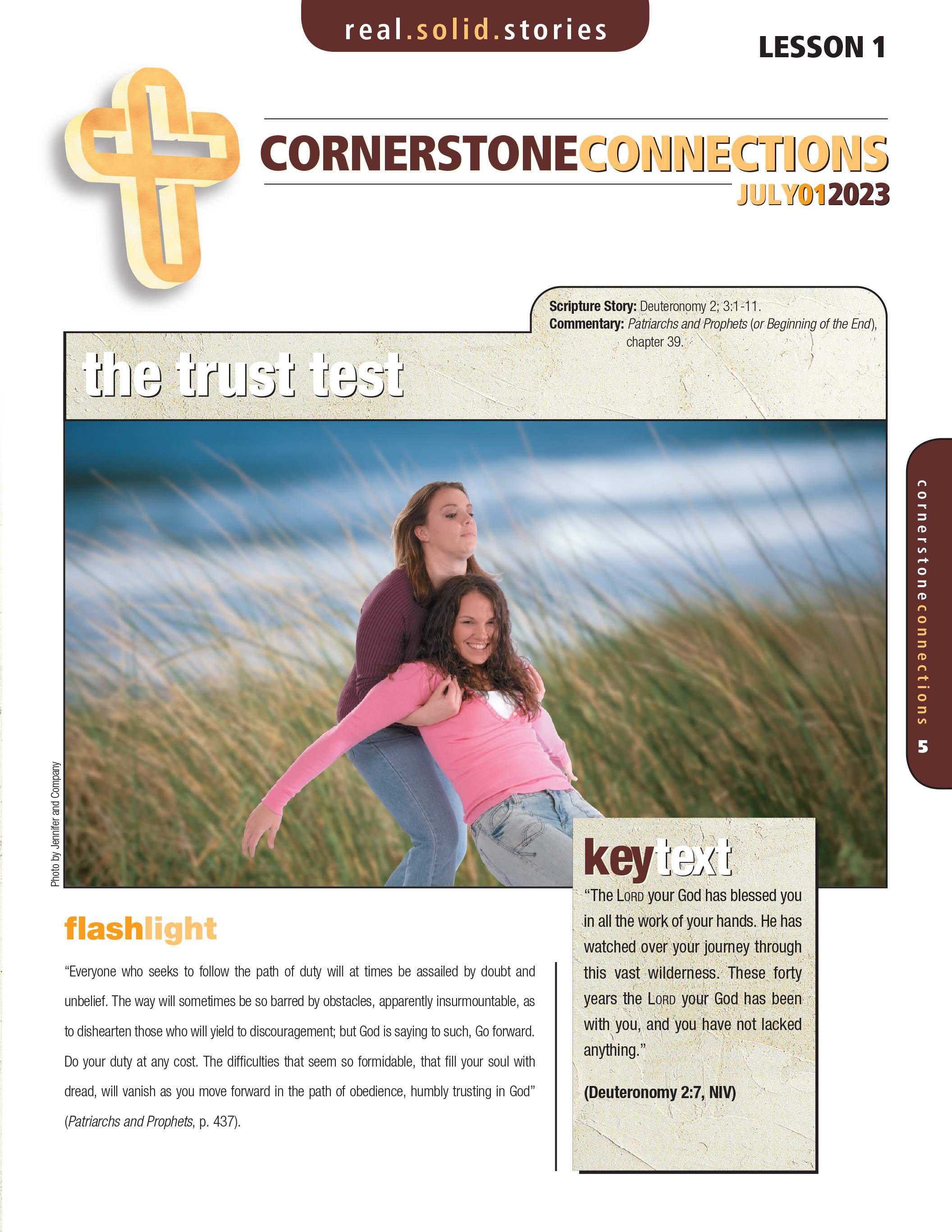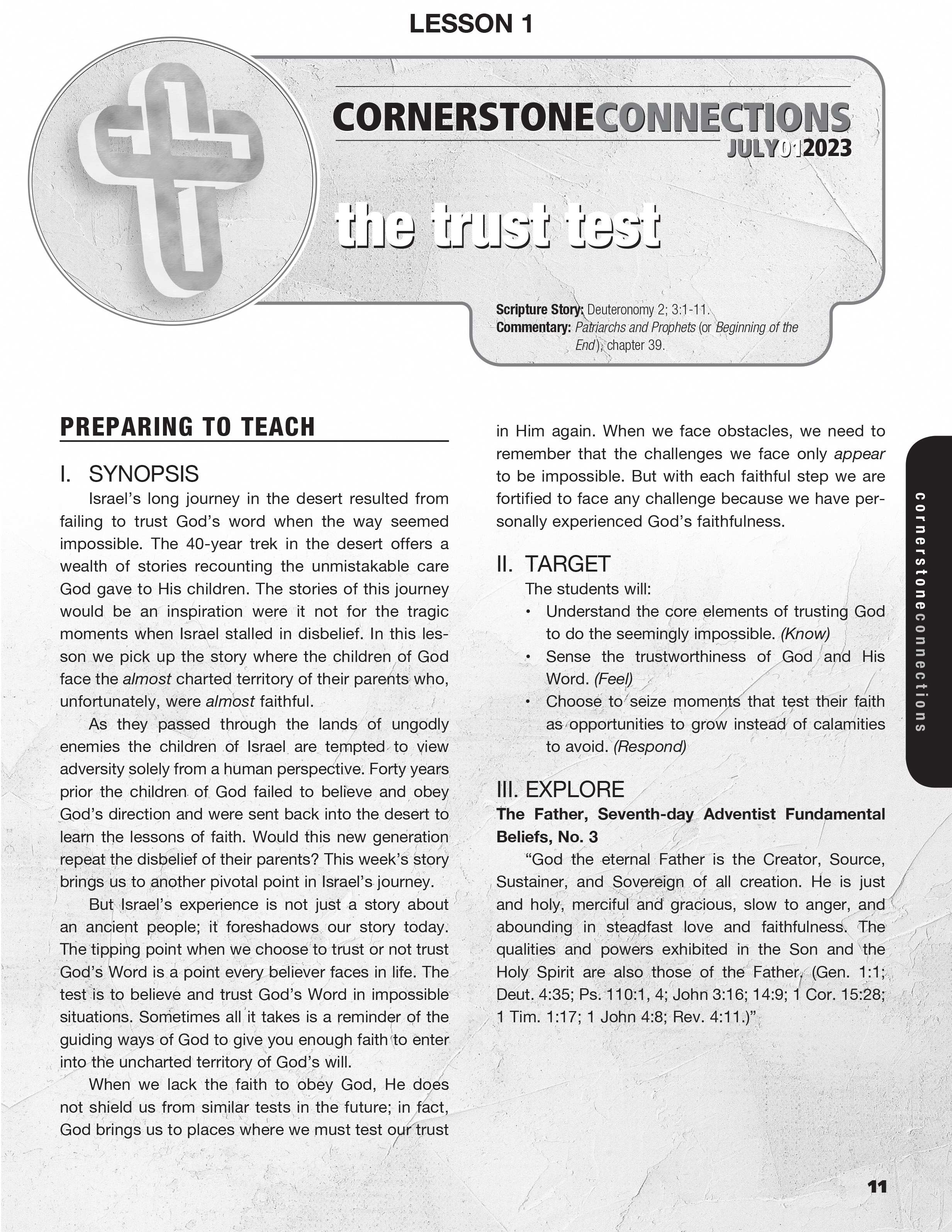"The Trust Test"
Click below to download the Cornerstone Connections leader’s guide and student lesson. This week’s resources also include two lesson plans and a discussion starter video which offer different ways of looking at the topic. Each lesson plan includes opening activities, scripture passages, discussion questions, and real-life applications.
God’s ultimate act of grace at the cross is foreshadowed by the serpent of bronze to whom the Israelites are to look for healing.
SCRIPTURE PASSAGES
OVERVIEW
This week we are looking at the Israelites at the end of their 40 years of wandering in the desert. Have they learned the lessons they needed to? Does this generation have the faith that the previous generation lacked? These are questions that the first few chapters of Deuteronomy are asking. Reading through the passages we get to meet some of the enemies, cousins, and neighbors of the people (and sometimes those things are not mutually exclusive.) God gives specific instructions for dealing with each nation whose territory they pass through, and in some ways it is a test of faith on the part of the people and their leaders.

OPENING ACTIVITY: “STAND YOUR GROUND”
You’ve probably played this game before as a kid on the playground, but I don’t know if it has a name so I’m calling this game “Stand Your Ground.”
Bonus Round: Facing Your Giants
Have students partner with someone who is a different height than them. Have the taller person stand on only one leg and play the game. Then switch and have the shorter person stand on one leg.
QUESTIONS
TRANSITION
Today we are looking at some passages of scripture that are easy to skip over when we are reading our Bibles. But as always it is important to remember that people wrote down these histories on purpose to help us learn about God and how God works through humanity. If we remember back to the story of the 12 spies who went to scout out Canaan the first time, we remember that they came back scared because of the big cities and even said that there were giants! How could they win against fortified walls and giant people? This lack of faith in God was a big reason why the children of Israel got to spend a bonus 40 years in the desert! Today we are going to be looking at facing our giants just as Israel figures out how to face theirs.
BIBLE STUDY GUIDE
Maybe you’ve heard the phrase “choose your battles” when it comes to handling difficult situations. Today’s text is literally about choosing your battles and the big idea of Deuteronomy chapters 2 and 3 is that the best way to choose your battles is to not choose them at all, but to let God take care of things! So today we are going to be looking at some of the battles that God told the Israelites to fight, and which ones He had them avoid. Then we will be asking ourselves some questions about the battles we fight, and whether we perhaps can learn something about faith in God’s plans from what we read.
It is helpful to remember as you read Deuteronomy that this book is basically Moses’ final message to the people. It is his reminder to a new generation to not repeat the mistakes of the previous generation. As you begin today I’d love for you to think about the following questions
QUESTIONS
As Moses recounts their history to Israel, he reminds them of some of their victories and losses in battle. He also reminds them of the battles that God told them to avoid. These were battles with peoples that God had promised land to. These are also people that we recognize from the book of Genesis and are distant relatives of the children of Israel. But they are relatives that were not always faithful to God.
Read Deuteronomy 2:3-9.
3 “You have made your way around this hill country long enough; now turn north. 4 Give the people these orders: ‘You are about to pass through the territory of your relatives the descendants of Esau, who live in Seir. They will be afraid of you, but be very careful. 5 Do not provoke them to war, for I will not give you any of their land, not even enough to put your foot on. I have given Esau the hill country of Seir as his own. 6 You are to pay them in silver for the food you eat and the water you drink.’ ”
7 The Lord your God has blessed you in all the work of your hands. He has watched over your journey through this vast wilderness. These forty years the Lord your God has been with you, and you have not lacked anything.
8 So we went on past our relatives the descendants of Esau, who live in Seir. We turned from the Arabah road, which comes up from Elath and Ezion Geber, and traveled along the desert road of Moab.
9 Then the Lord said to me, “Do not harass the Moabites or provoke them to war, for I will not give you any part of their land. I have given Ar to the descendants of Lot as a possession.”
DISCUSSION
I love that in this passage we are reminded that we don’t always need to be in battle mode! Often we think we need to be at war, but God is guiding us to peace. And even when we do find ourselves in a battle situation it is important to remember that God is the actual warrior. He is the one that brings victories. In fact, that is the message that the original children of Israel forgot. Their losses came when they went against the command of God and tried to fight their own battles. It was after those losses that they became afraid because they realized that on their own they couldn’t win. But check out what happens when God fights battles ahead of us!
Ready Deuteronomy 3:1, 2 and 11.
Next we turned and went up along the road toward Bashan, and Og king of Bashan with his whole army marched out to meet us in battle at Edrei. 2 The Lord said to me, “Do not be afraid of him, for I have delivered him into your hands, along with his whole army and his land. Do to him what you did to Sihon king of the Amorites, who reigned in Heshbon.”
11 (Og king of Bashan was the last of the Rephaites. His bed was decorated with iron and was more than nine cubits long and four cubits wide. It is still in Rabbah of the Ammonites.)
DISCUSSION
Today we talked about battles. Sometimes God is reminding us not to fight. Always God is reminding us that we never fight, that is His job. I hope that today we can have the faith to let God go ahead of us in the battles in our lives.

APPLICATION

SCRIPTURE PASSAGE
LEADER’S NOTE
For a Relational Bible Study (RBS) you’ll want to get into the Scripture passage and encourage the youth to imagine participating in the story while it’s happening. Then you will be able to better apply it to your own situation today.
You will need to ask God for the Holy Spirit to be present as your small group discusses the questions (no more than 3-6 people in a group is recommended). Start with the opening question. It is a personal question and the answer is unique for each individual. There is no right answer and nobody is an expert here, so don’t be surprised when you hear different responses. You are depending on the Holy Spirit to be present and to speak through your group. Say what God prompts you to say, and listen to what others share.
Take turns reading the chapter out loud. Follow that with giving the students some time to individually mark their responses to the questions (a PDF version of the handout is available as a download). This gives each person a starting point for responding when you start to share as a group. Next, begin the discussion by asking the students to share what they marked and why on each question as you work your way through. Feel free to take more time on some questions than others as discussion warrants.
Encourage each person in the group to apply what is discussed to their personal lives and to share with the group what they believe God wants them to do. Then ask them to pray that God will help each of them to follow through in doing so. Remind them to expect that God will show them ways to live out the message of this passage in the coming week, and that they are free to ask others in the group to help hold them accountable.
INTRODUCTION
God wants to bless His children. He wants us to have good things. If that is the case, why is it that some blessings come with a fight?
As children of God, sometimes we treat the blessing of God like a McDonald’s order. Not only do we want it supersized and right away, but we want to put in very little effort to get it.
Consider the following. David was promised the kingdom, but not without first being pursued by Saul. Joseph was shown that he would one day rule, but not without first being placed in a pit and prison. The children of Israel were told that they would one day inherit a promised land, but not without first driving out the inhabitants who were already there. So, what’s the deal?
In order to answer that question, let’s focus our attention on the text of the day. While we’re at it, perhaps we can even skim through Deuteronomy 2 and 3 to see what can possibly be uncovered and discovered.
God Does Not Work Drive-Thru
Name three to four items you enjoy ordering from the drive-thru.
Read Deuteronomy 2:7.
7 The Lord your God has blessed you in all the work of your hands. He has watched over your journey through this vast wilderness. These forty years the Lord your God has been with you, and you have not lacked anything.
1. In what way can “blessed hands” be a blessing to others?
They can be used to offer someone prayer.
They can be used to clean up a neighborhood or park.
I can use them to call and check on someone.
I can use them to help someone look up a scripture text.
They can be used to prepare dinner for someone in need.
I can use them to play a song to encourage someone.
I can use them to write words of affirmation to someone.
They can be used to help in a community building project.
Other.
2. What things have you worked hard at to obtain?
Developing a relationship with God.
Getting or maintaining good grades.
Learning to play an instrument.
Learning a foreign language.
Becoming healthy.
Being a better sibling.
Breaking bad habits.
Making an epic TikTok video.
Perfecting/maintaining your gaming status.
Other.
3. Why does God want our participation in receiving blessings?
He wants us to appreciate the blessing.
He doesn’t want us to squander the blessing.
He wants us to realize the magnitude of the blessing.
He requests that we brag about it to others later.
He wants us to know the meaning of hard work.
He desires for us to help others when given the opportunity.
He does not want us to take it for granted.
He does not want us to forget what it took to get it.
Other.
4. Waiting can be hard. What things can you do to help you while waiting?
Pray more.
Re-count the things God has done for you in the past.
Assist someone else while you wait.
Trust in God
Take up a new hobby.
Learn a new skill.
Commit God’s word to memory.
Distract yourself with something else.
Other.
5. Why would God ask Israel to fight for what He had already promised?
God wanted the surrounding nations to notice Israel’s God.
He was teaching them a lesson on stewardship.
God wanted them to turn to Him for help.
He was testing them to see how badly they really wanted the land.
God wanted the other nations around Israel to fear them.
He had something to prove to Israel.
He was tired of helping Israel.
God wanted Israel to take some kind of ownership.
Other.
6. In what ways has God “blessed” your hands?
He helped me pass a test.
He helped me score a point.
He helped me win a contest.
He helped me reconcile a broken relationship.
He helped me create something new.
He helped me accomplish a task.
He helped me learn something I was struggling to know.
He helped me comfort someone who was hurting.
Other.
7. In what ways has hard work paid off for you?
8. Which do you appreciate more, things you had to work hard to get, or things that were given to you? Explain your answer.
CONCLUSION
As we read in the text, the Lord seeks to bless the work of our hands. He does this by working alongside us. He doesn’t just hand things over to us like a bag out of the McDonald’s drive-thru window. As we participate with Him, we learn how to depend on Him. As we depend on Him, we build and develop our confidence in Him. This is the Christian walk.
When Christ died for us, He secured our inheritance. He secured the promise of our being reconciled with the Father. Therefore, let us remember these things, and be like Israel. Let us partner with God and fight to secure that which has been promised.

APPLICATION
1. WELCOME TO MCDONALD’S.
This week when you find yourself in prayer with God, try not to let your prayer become an order of a bunch of demanding requests. Instead, become mindful of your words as you ask Him to show you how to accomplish difficult tasks.
2. SUPERSIZE IT.
We serve a big God, who is able to deliver in BIG ways.
As you do your part, be it studying for a test, practicing with an instrument, or preparing for a game, ask God to help you “supersize it.”
Ask Him to help you ace the test. Ask Him to help you nail the notes. Ask Him to help you score the win.
3. DO YOUR PART.
When it comes to securing promises, God requires our participation.
As you prepare to face this week’s battles, commit to memory several key texts that you can apply to difficult situations.
As you put your hand forward to accomplish your tasks, don’t just recite them, claim them.
4. RECLAIM YOUR TERRITORY.
Maybe there are some things that you have given up on because they were too hard.
This week revisit them as already being conquered.
Trust God to help you reclaim the promised territory.





